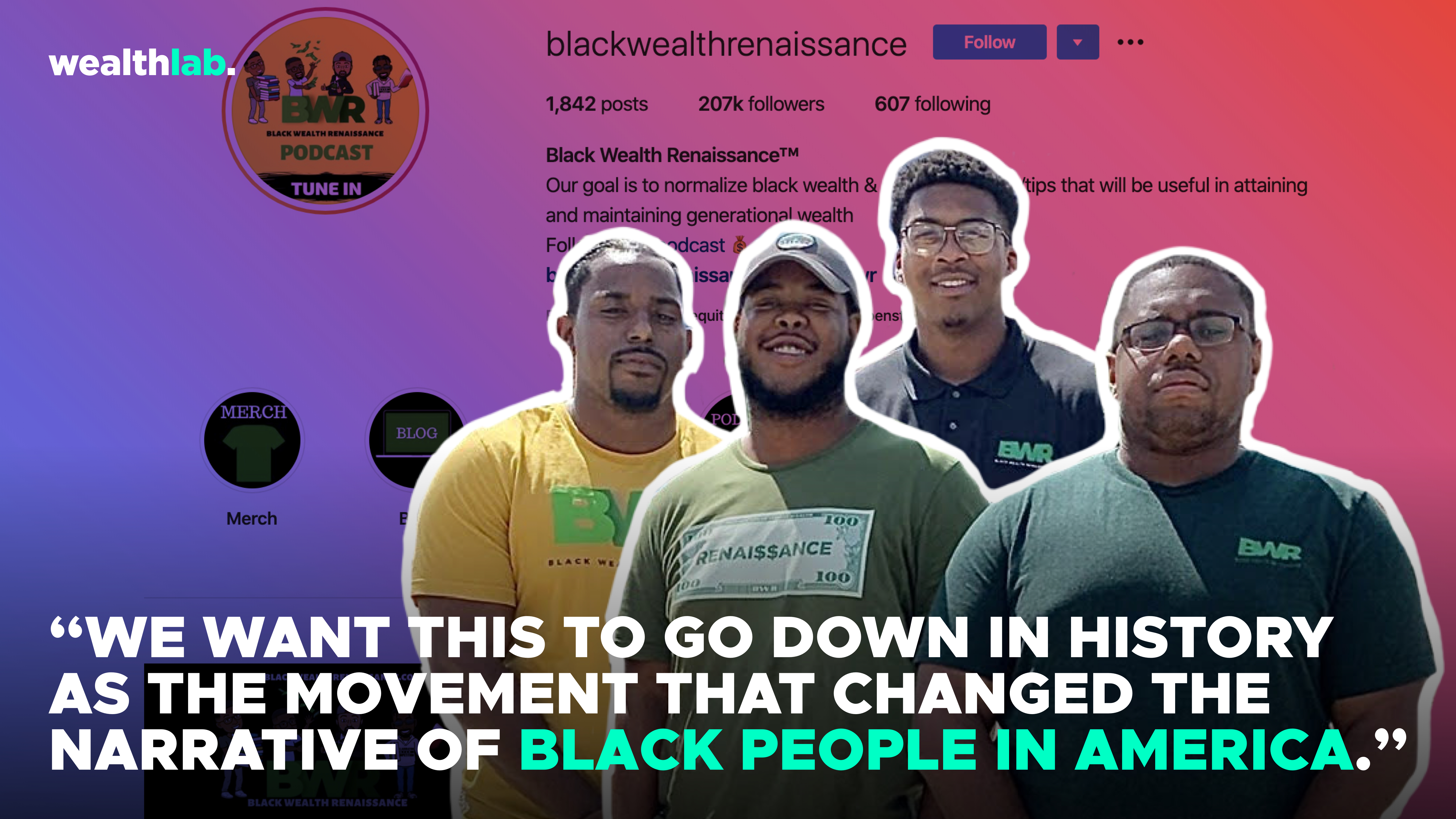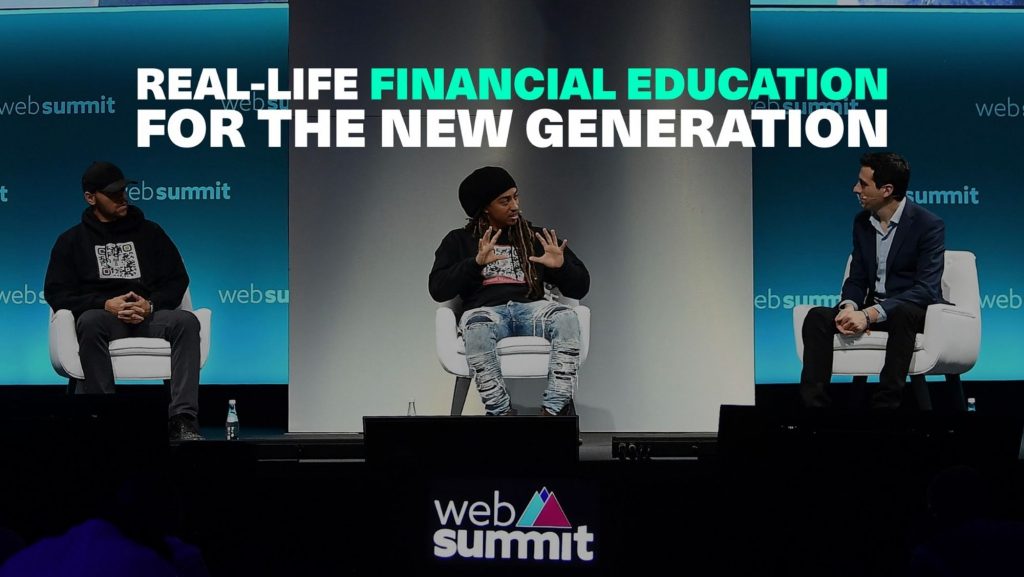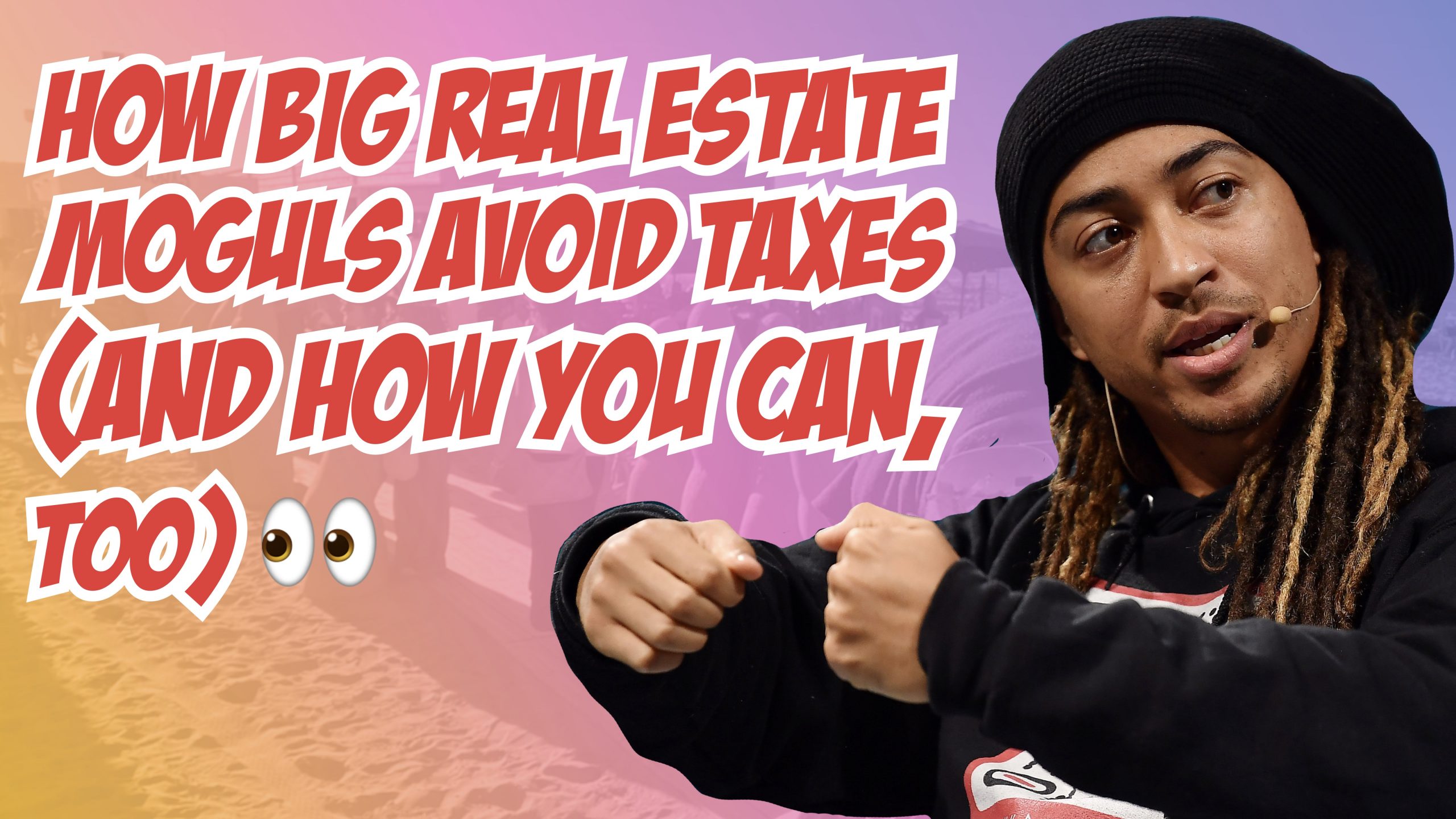Entrepreneurs
Exclusive Q&A: How These 4 College Roommates Built One Of The Top Black Wealth Channels On Instagram
Published
5 years agoon

It’s one of the more shocking stats that exist in America: Despite trillions in spending power, minorities are at the bottom when it comes to wealth. As of today, there’s a wealth gap that will take 228 years to close.
That said. There’s currently a movement on social media where a handful of Instagram channels provide real financial and wealth-building advice, particularly in the black community.
We spoke to the founders of one of our favorite channels, @BlackWealthRenaissance.
Ex-roommates in college, Jalen Clark, David Bellard, Jared Spiller and Kelly Rhodes started this as a passion project; they’ve since grown this 209K+ followers in about a year, with one of the most engaging audience on the ‘Gram.
In this two-part Q&A, they break down the importance of wealth building, their mission and why it’s important to make your own table.
(Editor’s note: This interview was done by WealthLAB editor-in-chief/real estate developer Philip Michael.)
Congrats on all your success. In such a short time. So tell people. What is Black Wealth Renaissance?
Jared: Black Wealth Renaissance is a movement. Our goal is to normalize the topics and conversations around wealth growth and educate African American people through education and awareness through social media.
We will educate as many people as we can reach on ways to achieve financial freedom and positive examples of people who have or are on their way to financial freedom.
David: Like Jared said, it’s a movement. We want to encourage those in our community to take action, educate themselves on finances and personal development, learn how to invest, understand the abundance of opportunity out there, and exhibit unity through practicing self love and group economics.
It’s really about embracing an abundance mindset and understanding that we can change our realities if we change our thinking.
So that’s the mission tied to the brand?
Kelly: Black Wealth Renaissance is more than just a brand; it’s part of a change in culture. We wanted to continue this movement on African Americans learning financial literacy because it’s not taught in schools.
And most parents don’t even understand some financial literacy concepts to be able to teach to their children. So we created this brand to generate a space where everyone can learn how to build generational wealth.
It’s a really cool name, too.
Jalen: Black Wealth Renaissance is more than just a catchy name or an Instagram account. We are seeing a time of enlightenment in our community—as well as culture—so we decided to highlight the positive energy and impact that is currently happening around us.
What are some of the core messages you guys are trying to push?
Jalen: We want to take away the stigma of money being the root of all evil within our community and show people how it can be a tool of empowerment and ever-lasting change.
That’s dope.
Jalen: To sum it up BWR is a shift from asking for what we want to going out and grabbing life by the horns and taking control of your own destiny.
How did the mission come about; why did you start it?
David: The mission began really more-so as a passion project. Jared, Kelly, and I were roommates in college and this is the type of stuff we were always talking about at home.
So how did it become an actual idea?
David: The idea of creating an IG page had been something that we floated around because it was a lot of knowledge that we were gaining that we wish we had known earlier—and wanted to share it with others.
One day while having one of our many conversations on the topics of culture and finance, I told Jared, “Man, let’s just go ahead and make the page” and here we are seven months later.
Jared: The mission came about after myself and my roommates, Kelly and David, read Rich Dad, Poor Dad.
A classic!
Jared: Yes. We began researching different avenues to create passive income and experimented with many different projects that we never knew would lead up to Black Wealth Renaissance.
One day, David and I were talking about different ideas and concepts we had heard from our favorite podcast and were talking about how we wanted to spread the word about financial freedom. And he told me to go ahead and start the page.
What happened next?
Jared: From there, we’ve grown as a team and continue to push towards our goal of educating as many people as possible and exposing them to various pathways to financial freedom.
Kelly: I noticed that Jared and David created a page that had some good inspirational quotes on it, but I did not fully understand what their goals were in the page.
I called them one night after I got an idea about creating a financial literacy page to help build a brand so we can start a podcast we always talked about.
They told me that was the plan of the page they already created and that they wanted me to be part of this movement.
I think the biggest thing for us growing like we did is from the beginning we focused on helping and teaching to better their financial situations that has always been—and will be—the goal.
What was your role in all this, Jalen?
Jalen: I was in the background when the page got started, but I was always there since David and I are such good friends; we’re constantly around each other, so I would hear him talking to Jared, discussing certain things and would give my input on the topics.
So it wasn’t your plan to join right away?
Eventually I couldn’t fight it because I was just as passionate about the things they were talking about and doing. Once the page started to really growing, I jumped on board and haven’t looked back.
I’ve said this publicly, my goal is to help create 100K new investors create generational wealth through real estate. What’s the goal behind your mission?
David: Short term goal is to encourage the conversation of building wealth, while providing tools and resources that can help people take actionable steps to achieve that wealth.
Long term goal is creating an education system to teach financial literacy to the black masses, providing a platform where we can come together to invest in each other’s companies.
To create economic independence in our community so that we can begin to implement the changes our people have long sought.
Instead of continually asking for it, because obviously that ain’t working. We want this to go down in history as the movement that changed the narrative of Black people in America.
Incredible. Love it.
Jared: To help people. We truly believe that through education we can change the narrative around a lot of problems and hurdles in the African American community.
Once we can change these types of conversations into everyday topics, a lot of things will change for our communities.
I always believed the number one difference between wealth in cultures is what’s discussed around the dinner table, those everyday conversions.
Jared: We just want to get the conversations around financial freedom normalized amongst the African American community.
Kelly: The goal behind Black Wealth Renaissance is to help—and teach—others how to create generational wealth. Most people would read that and think we want just everyone to have a ton of money—which is nice—but is not our specific goal.
It’s about understanding money. So many things that aren’t being taught.
Kelly: We want to have African Americans learn financial literacy so they can teach the next generation; so the learning curve for them won’t be as steep.
We also want people to be able to pass on businesses, land, real estate, etc. to the next generation, ultimately changing the financial status of not only them but their heritage.
Jalen: When I think on the mission, I think of it as “to normalize black wealth and share helpful resources and tips we believe will be useful in attaining and maintaining generational wealth.”
That’s it exactly.
Jalen: It creates an image in my head of more couples and families that look like the Carters and the Obamas.
I think instead of hearing this person is the “first black person to do such-and-such,” you’re going to hear more of this person was “the first person to ever do this.”
I always thought it was so limiting to say that.
Jalen: Right. We won’t have to compete for a spot at the table; we are creating our own table. And a spot at other tables will become an open invitation that we have the right to accept or refuse.
That’s true freedom right there.
Jalen: We want the topic of personal finance and financial education to be held and taught to the youth and elderly so it is no longer a taboo or sore subject within our community.
We want to break the social molding of “looking like money,” while struggling to pay the bills.
The mission is also deeper than creating wealth through money this mission is to become wealthy in all walks of life personal, mentality, collectively, and spiritual.
Entrepreneurs
The Top 10 Investment Opportunities To Capitalize On During A Recession
Published
3 years agoon
May 5, 2023
A recession can be a challenging time, but it can also present opportunities for investors to make smart investment decisions.
During a recession, certain industries tend to perform better than others, and identifying these opportunities can be the key to success.
Here are the top 10 investment opportunities to capitalize on during a recession:
1. Defensive Stocks
Defensive stocks are those that tend to perform well EVEN during economic downturns.
These include companies that provide essential goods and services, such as healthcare, utilities, and consumer staples.
Defensive stocks may not offer the highest returns, but they can provide stability and protection during a recession.
Defensive stocks include Johnson & Johnson, Procter & Gamble, PepsiCo, and Walmart, among others. (You can buy them all inside the NYCE app.)
2. Gold
Gold is often seen as a safe haven during times of economic uncertainty.
As a tangible asset, it can provide a hedge against inflation and currency fluctuations. During a recession, the price of gold may rise as investors seek a safe haven for their money.
READ: 3 Ways To Invest In Gold (In 3 Minutes Or Less)
3. Real Estate
Real estate can be a good investment opportunity during a recession. Especially if you are looking for a long-term investment. (Hence why NYCE exists.)
While property values may dip during a recession, they tend to recover over time. In addition, rental properties can provide a steady stream of income, even during a recession.
After all: Real estate has created more millionaires than any other asset class.
4. High-Quality Bonds
High-quality bonds, such as U.S. Treasury bonds, can be a safe investment during a recession.
These bonds are backed by the full faith and credit of the U.S. government, which makes them less risky than other types of bonds. (Though this has become less safe today than in the past.)
They may not offer the highest returns, but they can provide stability and protection during a recession.
5. Consumer Discretionary Stocks
Consumer discretionary stocks are those that are tied to consumer spending, such as retail, travel, and entertainment companies.
During a recession, these stocks may suffer as consumers cut back on non-essential spending.
However, if you believe that the economy will recover, investing in consumer discretionary stocks can be a good bet.
6. Healthcare Stocks
Healthcare stocks tend to perform well even during economic downturns, as people still need healthcare services regardless of the state of the economy.
In addition, the aging population in many countries is driving demand for healthcare services, which can provide long-term growth opportunities for investors.
7. Technology Stocks
Technology stocks can be a good investment opportunity during a recession, as many companies in this sector have strong balance sheets and cash reserves.
In addition, the shift towards remote work and online shopping during the pandemic has increased demand for technology products and services.
8. Emerging Markets
Emerging markets can be a good investment opportunity during a recession, as these countries may be less affected by the economic downturn than developed countries.
In addition, emerging markets often have higher growth rates than developed countries, which can provide long-term growth opportunities for investors.
9. Dividend Stocks
Dividend stocks can be a good investment opportunity during a recession, as they provide a steady stream of income even during tough economic times.
Look for companies with a history of paying dividends and a strong balance sheet.
10. Cash
Finally, cash can be a good investment during a recession, as it provides flexibility and liquidity. Having cash on hand can allow you to take advantage of investment opportunities as they arise.
In conclusion, while a recession can be a challenging time for investors, it can also present opportunities for smart investment decisions.
By identifying the top investment opportunities during a recession, you can position yourself for long-term success.
Entrepreneurs
From Zero to Millionaire: How 9-5 Marketing Guy Made A Fortune Selling Pet Rocks As A Joke (1)
Published
3 years agoon
April 26, 2023
No BS—this is actually a real story.
The pet rock—a seemingly ridiculous idea—became a sensation and made its creator, Gary Dahl, a millionaire in the 1970s.
Dahl, a marketing executive, came up with the idea as a joke during a conversation with friends.
He packaged rocks in a cardboard box with holes and called them “pet rocks,” complete with an instruction manual on how to care for them.
There was virtually no upfront investment, as the rocks themselves were free, and the packaging was inexpensive.
“It was a joke,” Dahl told ABC News years later. “It was a satire. It was fun. And it became an overnight success.”
The pet rocks became an instant hit, with Dahl selling over a million of them in six months.
LEARN: How to build a $100K side hustle in 1 hour.
He appeared on popular TV shows and even wrote a book about his success. The pet rock craze died down after a year, but Dahl had already made his fortune.
After the pet rock craze died down, Gary Dahl continued to work in marketing and advertising.
He also tried to launch other novelty products, such as “sand-breeding kits” and “mood rings,” but none of them achieved the same level of success as the pet rock.
“I think that’s one of the things that is wrong with business today. People are so serious, they forget to have fun,” Gary Dahl said.
The success of the pet rock shows that sometimes the most unconventional ideas can lead to great success.
Case Study: How A $49 Investment Could Make You $100K+ In 6 Months
Why Gary’s story matters to you…
The story of Gary Dahl and his pet rock is a testament to the power of thinking outside the box. Sometimes, it’s the seemingly ridiculous ideas that can lead to the biggest successes.
Dahl’s story is not only inspiring, but it’s also a reminder to keep a sense of humor and not take ourselves too seriously.
In business, it’s easy to get bogged down in strategy and analysis, but we should never forget the importance of creativity and fun.
The success of the pet rock is also a lesson in the power of marketing.
Dahl’s packaging and instruction manual turned a simple rock into a desirable product. It’s a reminder that sometimes it’s not the product itself that’s important, but how it’s presented to the world.
So if you’re feeling stuck in your business or just need a little inspiration, take a cue from Gary Dahl and his pet rock.
Keep an open mind, don’t be afraid to take risks, and don’t forget to have a little fun along the way.
Who knows…you might just come up with the next big thing.
About author:
wealthlab is a platform for hustlers, doers, entrepreneurs and investors to do epic s&%. Our mission is to create 100M new investors worldwide. Join our academy here.*
Don’t miss:
- ‘I work just 2 hours a day’: A 24-year-old who makes $8,000 a month in passive income shares her best business advice
- This 38-year-old makes $160,000 per month in passive income—after losing his job: ‘I work only 5 hours a week now’
- This 33-year-old mom makes $760,000 a year in passive income—and lives on a sailboat: ‘I work just 10 hours a week’
Sign up now: Learn how to retire with $1M with our wealth academy.
Business
How Big Real Estate Moguls Avoid Taxes (And How You Can, Too) 👀
Published
3 years agoon
August 25, 2022
I was looking around Google for an old article on tax strategies and this five-year old video of myself happened to pop up.
I’m interviewing a tax expert about how real estate investors avoid paying taxes in perpetuity—AND how everyday citizens can do the same thing.
(Real estate—our TEMPLE I and TEMPLE II projects included—has a number of tax benefits savvy investors have capitalized on for years, including Opportunity Zone breaks and 10-year tax abatements.)
There’s the 1031 exchange, of course, which I’ve shared with you guys before.
Just to refresh your memory, the 1031 Exchange allows you to roll over gains from your last project into a new property TAX FREE—as long as said property is worth the same or more.
But there’s ANOTHER TAX LOOPHOLE that can take your portfolio to an entirely new level by splitting your capital gains into MULTIPLE properties.
So I thought I’d share it with you guys. 💎
You can check it out here.
Let me know what you think. 😎
PS: In our next update, I’m going to break down how real estate moguls get paid from their properties…tax free. 👀
PPS: If you want to learn how to implement generational wealth strategies like this one, you can join our NYCE wealth academy (TRIBE U) here.
Top 5 Best Investment Strategies To Survive A Recession
The Top 10 Investment Opportunities To Capitalize On During A Recession
3 Gold Mining Stocks To Buy Today 📲
Ad 1
Trending

You’ve reached your free article limit.
Continue reading by subscribing.
Already a subsciber? Login >
Go back to Homepage >




